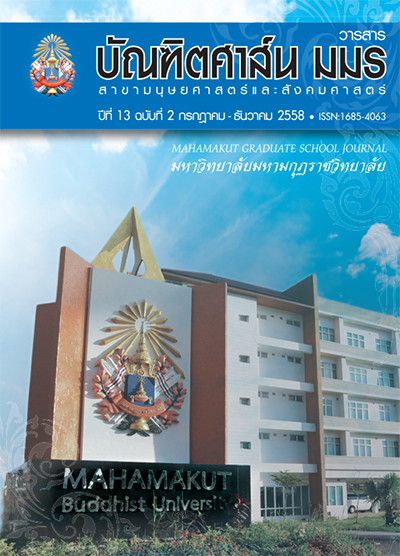ศึกษาวิเคราะห์การใช้หลักทศพิธราชธรรม ในการปกครองคณะสงฆ์ของ สมเด็จพระญาณสังวร สมเด็จพระสังฆราช สกลมหาสังฆปริณายก
บทคัดย่อ
วิทยานิพนธ์นี้ มีวัตถุประสงค์ ดังนี้ 1) เพื่อ ศึกษาหลักทศพิธราชธรรมและการปกครองคณะ สงฆ์ 2) เพื่อศึกษาการใช้หลักทศพิธราชธรรมใน การปกครองคณะสงฆ์ของสมเด็จพระญาณสังวร สมเด็จพระสังฆราช สกลมหาสังฆปริณายก 3) เพื่อวิเคราะห์คุณค่าและประโยชน์ของการใช้หลัก ทศพิธราชธรรมในการปกครองคณะสงฆ์ของสมเด็จ พระญาณสังวร สมเด็จพระสังฆราช สกลมหาสังฆ ปริณายก
วิทยานิพนธ์ฉบับนี้เป็นงานวิจัยเชิงคุณภาพ แบบวิจัยเอกสาร (Documentary Research) และการสัมภาษณ์อย่างเป็นทางการ (Structured Interview) โดยมีวิธีดำเนินการรวบรวมข้อมูลจาก เอกสาร คือ หนังสือ ตำรา และงานวิจัยที่เกี่ยวข้อง การศึกษาใช้วิธีวิเคราะห์ข้อมูล การประมวลผล และ การสรุปผลตามวัตถุประสงค์ของการศึกษา
ผลการวิจัยพบว่า
1) หลักทศพิธราชธรรมและการปกครอง คณะสงฆ์ ทศพิธราชธรรมเป็นหลักธรรมในการ ปกครองที่เหมาะสำหรับผู้นำหรือผู้บริหารในทุกๆ ระดับ ไม่ว่าจะเป็นระดับหมู่บ้าน ตำบล อำเภอ หน่วยงาน องค์กร ประเทศ และระดับโลก รวม ถึงการปกครองคณะสงฆ์ ไม่เฉพาะผู้นำเท่านั้นแต่ สามารถนำมาใชไ้ ดกั้บทุกๆ คน ซึ่งมีอยู่ 10 ประการ ดว้ ยกัน คือ ทาน หมายถึง การใหสิ้่งของแกผู่อื้่น ศีล หมายถึง ความประพฤติดีงามเสมอต้นเสมอปลาย ปริจจาคะ หมายถึง ความเสียสละ อาชชวะ หมายถึง ความซื่อตรง มัททวะ หมายถึง ความอ่อนโยน ตปะ หมายถึง ความเพียรพยายามแผดเผากิเลส อักโกธะ หมายถึง ความไม่โกรธเคือง อวิหิงสา หมายถึง ความไม่เบียดเบียน ขันติ หมายถึง ความอดทน เข้มแข็ง อวิโรธนะ หมายถึง ความไม่คลาดจากธรรม
2) การใช้หลักทศพิธราชธรรมในการปกครอง คณะสงฆ์ของสมเด็จพระญาณสังวร สมเด็จพระ สังฆราช สกลมหาสังฆปริณายก จะเห็นได้ว่า พระองค์ทรงให้ทานทั้งที่เป็นวัตถุทาน ธรรมทาน และอภัยทาน พระองค์ทรงเป็นผู้ทรงศีล ทรงธรรม อย่างเคร่งครัด มีความอ่อนน้อมถ่อมตน ทรงเป็น ผู้ซื่อตรงต่อหน้าที่ และซื่อสัตย์ต่อพุทธบริษัททั้ง หลาย ด้วยพระเมตตาจิตของพระองค์ท่าน ทรง เสียสละความสุขส่วนพระองค์ในการทรงงานพระ ศาสนา และเผยแผ่ธรรมะเป็นทานในทุกที่ทุก โอกาสด้วยความขยันและอดทน ทรงเสด็จโปรด เยี่ยมเยียนพุทธบริษัททุกหมู่เหล่า ทั้งพระภิกษุ สามเณร อุบาสก อุบาสิกา และพุทธศาสนิกชนทั้ง หลาย ทั้งในประเทศและในต่างประเทศ รวมถึงวัดวา อารามต่างๆ และสถานสงเคราะห์ ทรงให้ความช่วย เหลือดูแล บูรณะก่อสร้างสิ่งที่เป็นสาธารณประโยชน์ ไม่ว่าจะเป็นพุทธสถาน วัด โรงเรียง โรงพยาบาล และ สถานสงเคราะห์
3) คุณค่าและประโยชน์ของการใช้หลักทศ พิธราชธรรมในการปกครองคณะสงฆ์ของสมเด็จ พระญาณสังวร สมเด็จพระสังฆราช สกลมหาสังฆ ปริณายก พบว่า 1) ทาน พุทธบริษัททั้งหลายมีชีวิต ความเป็นอยูที่ดีขึ้น ได้รับการช่วยเหลือในด้านต่างๆ และช่วยทำนุบำรุงวัดวาอารามในพระพุทธศาสนา ทั่วโลก ช่วยบรรเทาความเดือดร้อนให้กับพุทธบริษัท ทุกหมู่เหล่า ช่ว ยจรรโลงวัดและพระพุทธศาสนาใหมี้ ความมั่นคงเจริญรุ่ง เรือง 2) ศีล พระภิกษุ สามเณรได้ แบบอย่าง และมีความตั้งใจรักษาศีลอย่างเคร่งครัด ได้รับความศรัทธาจากพุทธศาสนิกชน และอยู่ร่วม กันในสังคมอย่างสงบสุข ทำให้ง่ายต่อการบริหาร ปกครองคณะสงฆ์ 3) ปริจจาคะ พระภิกษุ สามเณรมี ความเป็น อยูที่สะดวกสบายขึ้น เกิดความเอื้อเฟื้อ เผื่อแผ่กันในสังคมด้วยดี ทำให้กิจการงานต่างๆ ของทาง คณะสงฆ์เป็นไปอย่างมีประสิทธิภาพ สำเร็จลุล่วงไป ได้ด้วยดี สร้างความเจริญรุ่งเรืองมั่งคงให้เกิดขึ้นใน พระพุทธศาสนา 4) อาชชวะ เกิดความเลื่อมใสศรัทธา ได้รับความไว้วางใจเชื่อถือจากพุทธบริษัท 4 ทุกหมู่ เหล่า ได้รับความเสมอภาค เที่ยงธรรม ยุติธรรมให้ เกิดขึ้นในคณะสงฆ์และสังคม ส่งผลให้การบริหาร ปกครองคณะสงฆ์มีความเป็นระเบียบเรียบร้อยดีงาม 5) มัททวะ ทำให้เป็นที่รักและเคารพศรัทธาของพุทธ บริษัททุกหมูเ่ หลา่ สรา้ งความสามัคคีและความเสมอ ภาคเทา่ เทียมกันใหเ้ กิดขึ้นในหมูส่ งฆแ์ ละสังคม คณะ สงฆ์มีความเป็นระเบียบเรียบร้อยดีงาม เกิดความ มั่นคงของพระพุทธศาสนาอย่างยั่งยืน 6) ตปะ ทำให้ กิจการงานต่างๆ ของคณะสงฆ์ย่อมประสบผลสำเร็จ มีประสิทธิภาพสูง พระพุทธศาสนามีความเจริญ รุ่งเรือง มั่นคงและยั่งยืน 7) อักโกธะ ทำให้เกิดความ ยุติธรรมขึ้นในสังคม การบริหารปกครองคณะสงฆ์มี ความเป็นระเบียบเรียบร้อยดีงาม มีความสงบสุขและ ความสามัคคีให้เกิดขึ้นในหมู่สงฆ์ทุกๆ นิกายและ ทุกๆ ศาสนา 8) อวิหิงสา ทำให้เกิดความสามัคคีขึ้น ในหมู่สงฆ์ พุทธบริษัททั้งหลายอยู่ร่วมกันอย่างสงบ สุข ไม่เบียดเบียนซึ่งกันและกัน การบริหารปกครอง คณะสงฆ์มีความเป็นระเบียบเรียบร้อยดีงาม 9) ขันติ ทำให้กิจการงานต่างๆ และแก้ไขปัญหาของคณะสงฆ์ บรรลุผลสำเร็จไปได้ด้วยดี มีประสิทธิภาพ เกิดความ เคารพยำเกรง เลื่อมใสศรัทธาในตัวผู้นำ จึงง่ายต่อ การปกครองบริหารกิจการงานคณะสงฆ์ 10) อวิโรธนะ สร้างความเคารพศรัทธา และความยำเกรงให้เกิดขึ้นใน หมู่สงฆ ์ ย่อมได้รั้บความร่วมมือเป็น อย่างดี การบริหาร ปกครองคณะสงฆ์มีความเป็นระเบียบเรียบร้อยดีงาม เกิดความยุติธรรมขึ้นในสังคม คนในสังคมอยู่ร่วมกัน อย่างสงบสุข ร่มเย็น
เอกสารอ้างอิง
ข้อมูลปฐมภูมิ การศาสนา, กรม. พระไตรปิฎกภาษาไทยฉบับหลวง เล่ม 10. พิมพ์เนื่องในโอกาสสมโภชกรุง รัตนโกสินทร์ 200 ปี กรุงเทพมหานคร : โรงพิมพ์การศาสนา, 2525.
ข้อมูลทุติยภูมิ
1) หนังสือทั่วไป
พุทธทาสภิกขุ. การตามรอยพระยุคลบาท โดยทศพิธราชธรรม. กรุงเทพมหานคร : สํานักพิมพ์สุขภาพ ใจ, 2549. วัดยานนาวา. ราชธรรมจริยวัตร พระบาทสมเด็จพระเจ้าอยู่หัว ภูมิพลอดุลยเดช รัชกาลที่ 9. พิมพ์ ครั้งที่ 3. นนทบุรี : สํานักพิมพ์ร่มธรรม, 2551.
วรทัศน์ วัชรวสี. 60 ปี พระเจ้าอยู่หัวครองราชย์ 100 ปี พระพุทธทาสครองธรรม. กรุงเทพมหานคร : เจริญวิทย์การพิมพ์, 2549.
สมเด็จพระญาณสังวร (เจริญ สุวฑฺฒโน) สมเด็จพระสังฆราช สกลมหาสังฆปริณายก. ทศบารมี ทศพิธราชธรรม. พิมพ์ครั้งที่ 3. กรุงเทพมหานคร : โรงพิมพ์มหามกุฏราชวิทยาลัย, 2544.
2) วิทยานิพนธ์/สารนิพนธ์
นรี ภวกานตานันท์. “การเมืองการปกครองในแนวพระพุทธศาสนา : ศึกษาจากนักคิดและพระไตรปิฎก”. วิทยานิพนธ์รัฐศาสตรมหาบัณฑิต. บัณฑิตวิทยาลัย : มหาวิทยาลัยมหามกุฏราชวิทยาลัย, 2538.
เปรม สังข์ศรีอินทร์. “การใช้ทศพิธราชธรรมของพระมหากษัตริย์ไทย : ศึกษาเฉพาะกรณีพระบาทสมเด็จ พระจอมเกล้าเจ้าอยู่หัว”. วิทยานิพนธ์ศาสนศาสตรมหาบัณฑิต. บัณฑิตวิทยาลัย : มหาวิทยาลัยมหามกุฏ ราชวิทยาลัย, 2551.
พัชราวดี ชูภักดี. “ศึกษาการนําหลักทศพิธราชธรรมไปใช้ในการบริหาร : ศึกษาเฉพาะกรณี เทศบาลเมือง ทุ่งสง จังหวัดนครศรีธรรมราช”. สารนิพนธ์ศาสนศาสตรมหาบัณฑิต. บัณฑิตวิทยาลัย : มหาวิทยาลัยมหา มกุฏราชวิทยาลัย, 2549.
พระแก่นจันทร์ สุจิตฺโต (สีพันนา). “ศึกษาเชิงวิเคราะหฺรัฐศาสตร์แนวพุทธในมิติทศพิธราชธรรม”. วิทยานิพนธฺศาสนศาสตรมหาบัณฑิต. บัณฑิตวิทยาลัย : มหาวิทยาลัยมหามกุฏราชวิทยาลัย, 2553.
พระประพันธ์ ปณญาทีโป (พิชนารี). “การปกครองแบบธรรมาภิบาล : ศึกษาเฉพาะกรณีหลักทศพิ ธราชธรรม”. วิทยานิพนธ์ศาสนศาสตรมหาบัณฑิต. บัณฑิตวิทยาลัย : มหาวิทยาลัยมหามกุฏราชวิทยาลัย, 2550.
พระสวัสดิ์ ธมฺมวิริโย (ทองคํา). “การใช้หลักทศพิธราชธรรมในการปกครองของพระเจ้าอโศกมหาราช : การศึกษาเชิงวิเคราะห์”. วิทยานิพนธ์ศาสนศาสตรมหาบัณฑิต. บัณฑิตวิทยาลัย : มหาวิทยาลัยมหามกุฏ ราชวิทยาลัย, 2554.
สุทิน ขุนสิทธิ์. “ศึกษาการนําหลักทศพิธราชธรรมมาใช้ในการปกครององค์การบริหารส่วนตําบล”. วิทยานิพนธศาสนศาสตรมหาบัณฑิต. บัณฑิตวิทยาลัย : มหาวิทยาลัยมหามกุฏราชวิทยาลัย, 2549.
ดาวน์โหลด
เผยแพร่แล้ว
รูปแบบการอ้างอิง
ฉบับ
ประเภทบทความ
สัญญาอนุญาต
บทความวิชาการและบทความวิจัยในวารสารฉบับนี้ถือเป็นความรับผิดชอบของผู้เขียนเท่านั้น บทความที่ได้รับการตีพิมพ์ในวารสารบัณฑิตศาส์น ถือเป็นลิขสิทธิ์ของมหาวิทยาลัยมหามกุฏราชวิทยาลัย ตามพระราชบัญญัติลิขสิทธิ์



